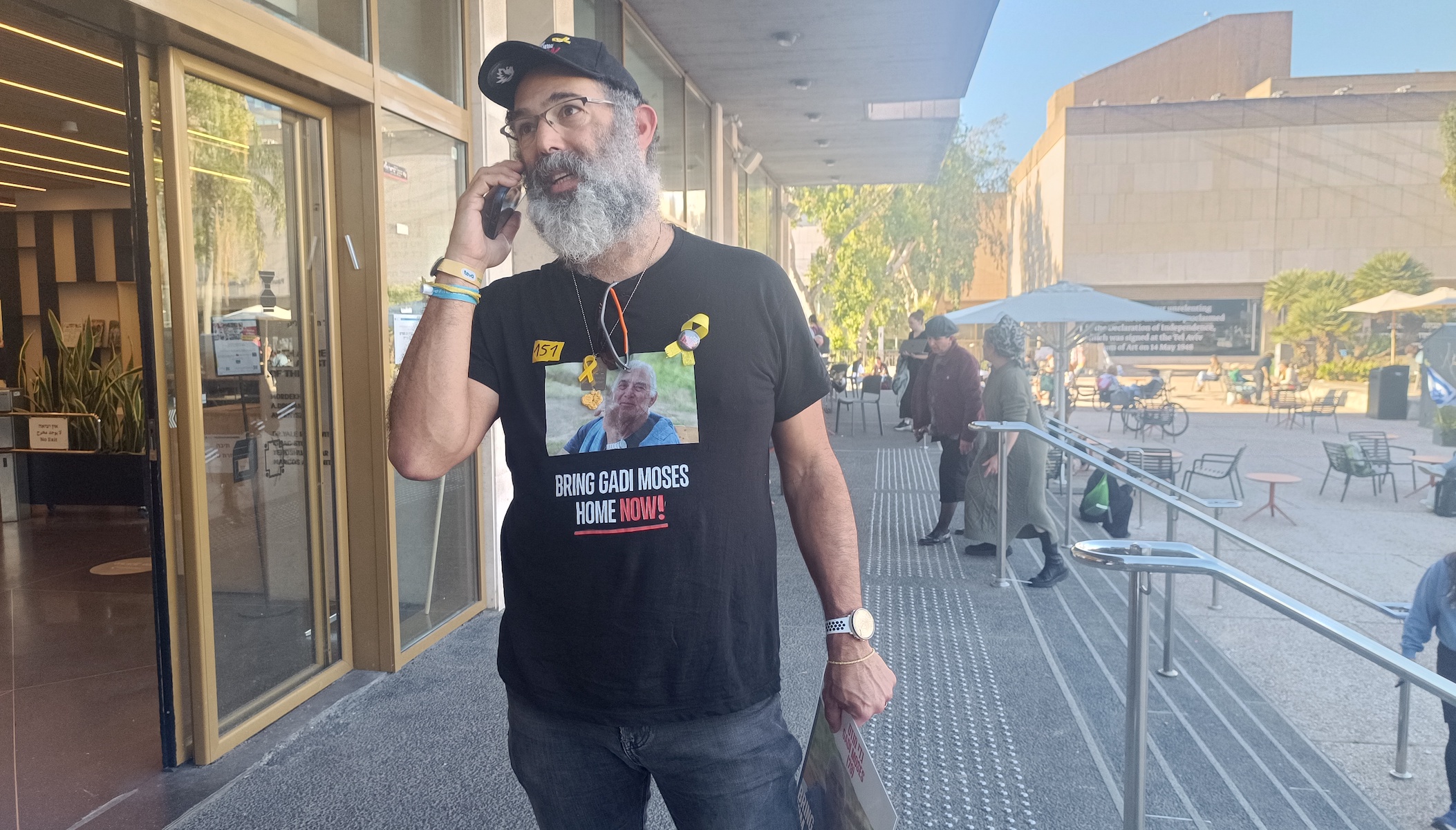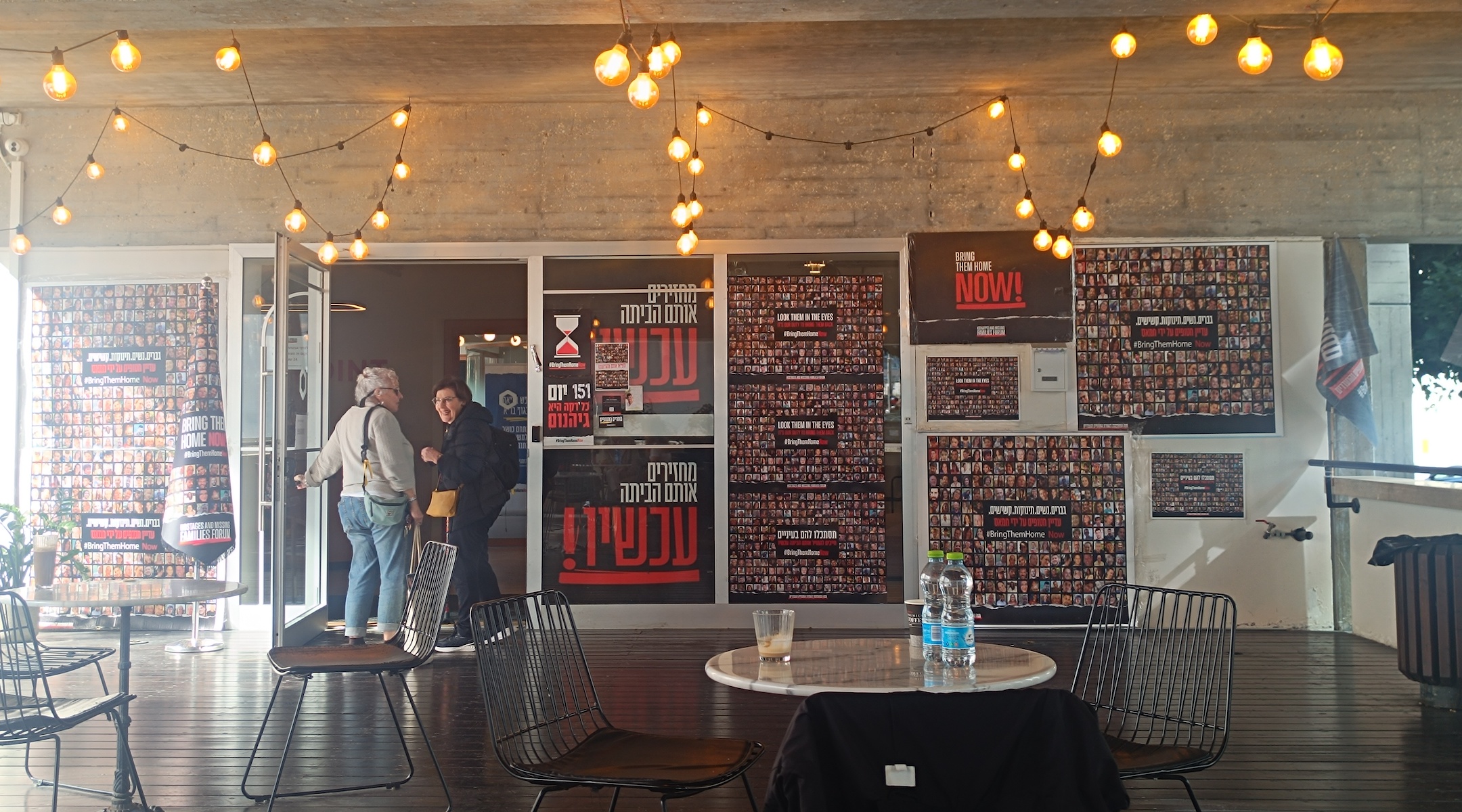TEL AVIV (JTA) — Every morning for the last five months, Yair Moses rises from his bed and recites a mantra: “Another day you must keep fighting.”
Then he dons a T-shirt with a portrait of his father, 79-year-old Gadi Moses, who was kidnapped along with Moses’ mother, Margalit, from Kibbutz Nir Oz on Oct. 7. Margalit was released in late November during a ceasefire — Gadi posted a photo online with the caption “Mom’s back!” — but Gadi remains a hostage in Gaza.
Yair has not shaved since Oct. 7, in an echo of a Jewish practice following the death of a close family member. He’s kept the practice going past his mother’s release and plans to continue until both of his parents are freed.
“It’s not mourning for me. It’s more saying my life stopped,” he told the Jewish Telegraphic Agency from Tel Aviv’s Hostage Square. “I hope to get back to my life before, but our life will never be the same.”
The square, next to Tel Aviv’s art museum, has become like a second home for Moses, who is on paid leave from his work at the Israeli pharmaceutical company Teva as he continues to advocate for his father’s return. The plaza also serves as the public gathering point for Israelis to demand the return of the hostages, of whom an estimated 136 remain, some 100 of whom are thought to be alive. It is also an exhibition ground for hostage-related art works.
Blocks away is a drab office building that serves as the headquarters of the Hostages and Missing Families Forum, the civilian advocacy organization that formed just days after Oct. 7 and has led the global effort to draw attention to the plight of the Israeli captives.
There, four floors donated by the cybersecurity firm Check Point remain abuzz with activity, as hundreds of volunteers and family members continue to report for duty daily. But five months into the hostage crisis, the intensity of energy is beginning to feel hard to sustain.
“Over 150 days, there were very few highs,” said Daniel Shek, Israel’s former ambassador to France and head of the forum’s diplomatic department, one of several divisions that span topics from public relations to health and wellness. “Most of them [were] around three months ago, when the first deal was happening, and hostages were being freed.”
He added, “Otherwise, it’s a lot of worry, and a lot of concern for their safety. And you know, you spent so much time with these people, they sort of get under your skin.”
Pressure on the forum has come from multiple directions. For one thing, the number of hostages is far lower than at the crisis’ start, when there were more than 250. More than 100 hostages — including almost all of the children and many of the women who had become symbols of the movement — were released during the temporary ceasefire in November when Margalit Moses was freed. Others have been killed or revealed to have died on Oct. 7. While their family members and even the released hostages themselves have become fixtures in Hostage Square, there simply aren’t as many people galvanizing action.
Now, months after any hostages were released, hopes are also dwindling about the prospects of another deal, or even that large numbers of the hostages remain alive amid the war and humanitarian crisis in Gaza. Hamas declined this week to furnish a list of living hostages, which Israel had demanded as a condition for any truce, and U.S. President Joe Biden has tamped down his optimism about a deal before Ramadan, the Muslim holy month that begins in several days. Negotiations over a truce recently stalled.
There have also been internal tensions, which have burst into public view with the recent departures of the forum’s three founders. Family members have sparred over how much to oppose Prime Minister Benjamin Netanyahu, who was the target of widespread political protests before Oct. 7 and now is seen by some as being insufficiently committed to securing the hostages’ release. Hostage families asked both Ronen Tzur and Dudi Zalmanovich to leave, and this week, Haim Rubinstein, the final founder, announced that he, too, was stepping down as an organizational leader, though he said he would remain involved..
“I’d rather they hadn’t left,” said Shek. “These are very talented people who have done amazing things here at the forum.”

Yair Moses’ parents were kidnapped on Oct. 7. His mother was released but his father is still in captivity. (Eliyahu Freedman)
Another group of hostages’ relatives are pushing in the opposite direction, staging rallies blocking humanitarian aid to Gaza in a bid to increase pressure for the hostages’ release.
And then there’s the simple fact that life has creaked back into a painful new normal for most Israelis, making it harder to devote as much time to the volunteer effort. Or Moshe, a student at Reichman University north of Tel Aviv, recalled staying at the headquarters until 2 a.m. for many nights in a row back in November, around the time of the releases.
Now, she still spends as much time as she can there, but Israeli universities have also reopened, and she has nine classes to juggle at Reichman.
“Technically we’re here to support them,” said Moshe, who was on break from classes and volunteering full-time this week at the headquarters’ international media desk, referring to the hostages.
“But I think they’re supporting us as much as we support them,” she said. “They’re giving us the strength to be here but obviously, it’s getting harder and harder.”
Still, despite the dispiriting pressures, the work within the forum’s headquarters continues. The space has the feeling of a tech startup, complete with coffee stations and snacks.
At the “creativity desk,” a mix of Israelis with careers ranging from television production, marketing and hi-tech huddled on a recent afternoon around a large table, planning their campaigns to tailor the message for global events like International Women’s Day on March 8. (The group also made videos that aired online in connection with the Super Bowl last month.) Other teams — tasked with social media, diplomacy, communications and other tasks — have their own spaces.
Some of the efforts have translated into real action. A legal team filed a complaint against Hamas in the International Court of Justice last month. The merchandise team sells T-shirts, dogtags, yellow-ribbons and other souvenirs at Hostage Square — ensuring that the messages travel far beyond the Tel Aviv epicenter of the movement.
But the activities remain patchwork to some degree, an outgrowth, Moshe said, of the forum’s abiding hope that freedom for the hostages will soon put it out of business.
“We don’t plan too much ahead,” Moshe said. “We are hoping that we won’t have to.”
One floor of the headquarters is reserved exclusively for family members of hostages, where they can relax and receive holistic treatments and counseling services. It’s off-limits to visitors, providing the families a rare respite in a country where their anguish is widely known. A recent survey found that families members of the hostages are suffering from a wide range of physical and mental health issues.
“It’s such a blessing that we have a place that all of us can meet together, and you meet new people that you couldn’t meet in any other way,” Yair Moses said. “We are family together, all of us.”
Volunteers continue to arrive from all over the world. Lauren Gutter, a retired caterer from Canada, came to Israel for three months to aid in the war effort. She volunteers in Jerusalem making tzitzit, or ritual fringes, for soldiers, a task that some Orthodox Jews have taken on to shore up the spiritual lives of soldiers. She has also sorted produce from the farms whose operations have been disrupted by the war.
Three times a week, she commutes to Tel Aviv to the forum headquarters, where she has made art pieces out of recycled yellow ribbons, baked meringues for the forum’s cafeteria and stepped in whenever a new need emerges.
“It’s just amazing to see the strength and positivity and the resilience of the families,” she said. “I’ve ever seen a community so unbelievable, where they would post a request for help on one of the WhatsApp groups and receive an answer within seconds.”
Shek, too, said working with the forum remains rewarding. His wife, Emilie Moatti, a onetime lawmaker for Israel’s Labor Party, has also volunteered.
“I don’t think I’ve ever felt that I’m doing anything as meaningful as these past five months,” he said.
The support buoys the families. Yair Moses, who unlike some of the families got a sign of life from his father in the form of a hostage video that Hamas released in January, said the community is essential as he continues to do his part to bring his father home.
“I don’t see another choice,” he said. “It’s like you know when you hear about someone who lifted up the car with his hands because his son was stuck under? This is how I feel. I’m lifting the car now with all the power I have in order to bring my father home — and all these friends of course.”
JTA has documented Jewish history in real-time for over a century. Keep our journalism strong by joining us in supporting independent, award-winning reporting.






